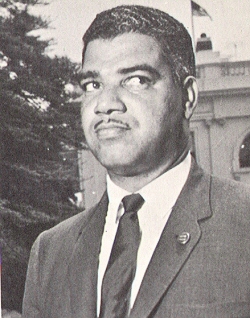
Lyric’s production, directed by Louisa Muller with sets and costumes designed by Scott Marr and lights by Duane Schuler, has a sense of that dynamic, even though any radicalism of point of view feels subsumed by a visually traditional a staging, filled with grand vistas of 16th century Spain and humans wandering through different palaces and tombs, their desires forever fighting with the scale of their surroundings. Russell Thomas and Tamara Wilson in Lyric Opera of Chicago's "Ernani."- Original Credit: (Cory Weaver / HANDOUT) If you look at the work through a less patriarchal point of view than has been common for most of its history, you see a woman struggling for self-determination and agency against three different fates, all chosen by men, only one of whom, at best, really sees her. That said, Ernani (Russell Thomas), the baritone Don Carlo (Quinn Kelsey), and bass Don Ruy Gómez de Silva (Christian Van Horn) are far from equal when it comes to the point of view of Elvira (Tamara Wilson), who is dealing with genuine (if a tad self-indulgent) courtship, an abductor (the king of Spain, no less) who forces her to grab her knife in her own defense, and a guardian who is enthusiastic about a forced marriage and uninterested in consent.

The characters in “Ernani” have personalities that match their voices, or should that be voices that match their personalities? Verdi’s genius was, I suppose, to take a French romantic drama by Victor Hugo (”Hernani”) and make that distinction moot.


Listening to that formatively rich swirl of roaring Verdi melody at Lyric Opera Saturday night, upon the opening of Lyric’s fall season and under the cheerfully exploratory baton of the music director Enrique Mazzola, was to reflect not just on how exquisitely Verdi could already harness form for musical and dramatic effect but to note again how much shared human stories are so often based on physical archetype.


 0 kommentar(er)
0 kommentar(er)
